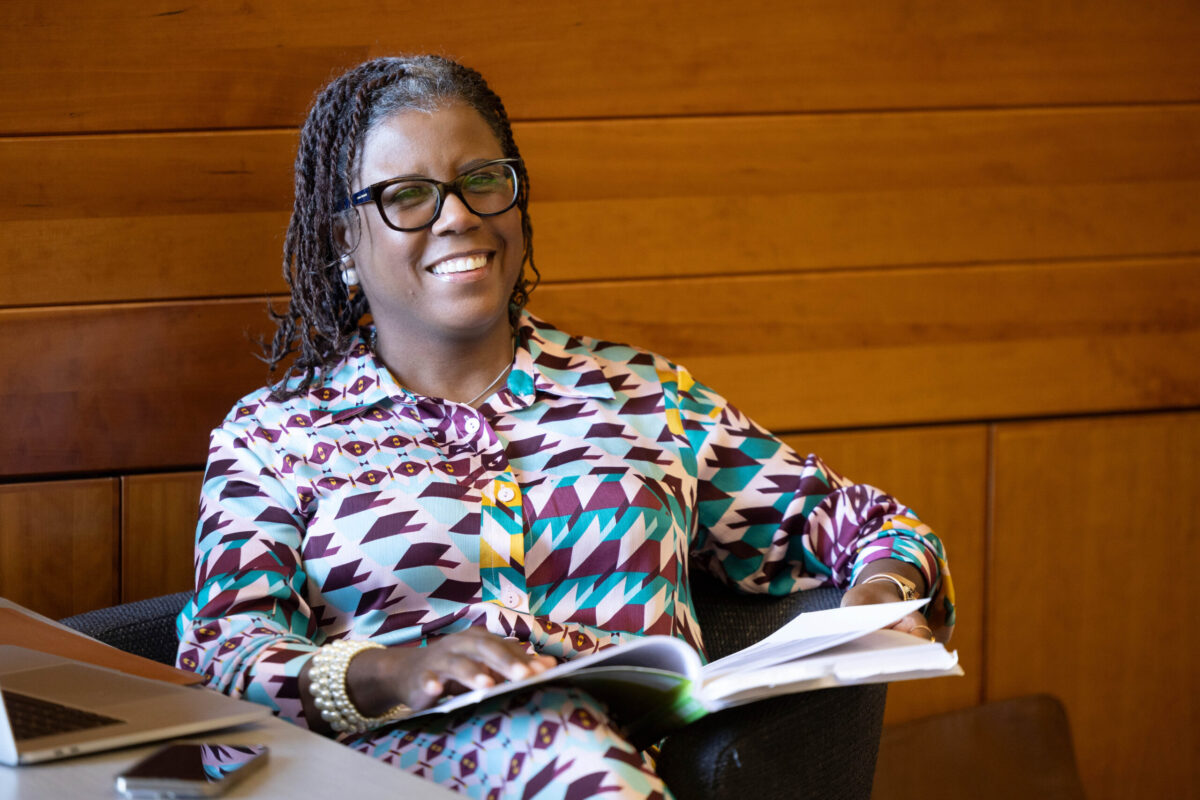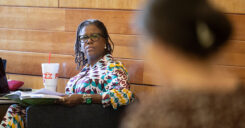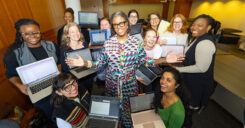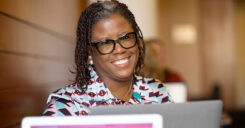
Creating safe spaces to retain women in academia
According to the National Center for Education Statistics, in fall 2020, Black women comprised less than 5% of faculty, 10% of student affairs administrators and 9% of students at degree-granting institutions in the U.S.
Associate professor and assistant director for the School of Special Education, Leadership, and Professional Studies, Dr. Nicole West is one of only seven tenured Black women professors at Missouri State University.
A job shift (from a university administrator to faculty) left West searching for a new community of colleagues. She was inspired to keep studying and creating safe spaces for women on college campuses, a term she coined as “professional counterspaces.”
A cross between a professional development program and a support group, professional counterspaces benefit marginalized individuals, like Black women in higher education, academically, professionally and personally.

Dr. Nicole West provides personal, professional and academic support for women and marginalized individuals in higher education. Kevin White/Missouri State University
The start of it all
Born in Massachusetts and then living most of her young life in Florida, West was used to being one of a few Black female students in her classes.
“It made getting through a doctoral program feel 10 times more difficult,” West said.
It was an unfortunately consistent theme but led her to seek out and appreciate professional counterspaces.
West’s dissertation — where her research started — was about the African American Women’s Summit (AAWS), a program she had attended for years.
West knew how the Summit had impacted her, both as a doctoral student and as a student affairs professional; however, there was no research about professional development programs created by and for Black women in higher education.
This was the tip of the iceberg for West’s research. She has since published five research articles discussing how professional counterspaces, like the AAWS, uplift Black women in higher education.
West expanded her research by developing her own professional counterspaces. In fall 2020, she created a group for Black women students, faculty, staff and administrators at Missouri State called Participatory Action Research Counterspace (PARC).
Consisting of 11 Black women, PARC members spent a year investigating the experiences of Black women on campus. Their investigation led to the Unlikely Allies Conference on campus, held in March 2022. It promoted racial allyship dialogue as a transformative strategy for institutional change.

Dr. West meets with her Wednesday Faculty Writing group in the Meyer Library on November 29, 2023. Kevin White/Missouri State University
Practicing action-oriented research
In traditional research models, there’s a divide between the researcher and the participants. West’s model for research differs because it uses co-participants. This levels the power dynamic, so everyone involved co-creates the research together.
“It would be fine to do this research just for the sake of expanding knowledge, but I’m most excited about seeing the tangible outcomes from the research,” West said. “I want to make a difference.”
Fellow PARC member Dr. Azaria Baggett, assistant professor of theatre and dance at Missouri State, said, “actively finding community and taking action to improve the larger community is what makes the PARC so effective. It’s the action piece.”
West and the PARC co-researchers analyzed data from individual interviews, 10 focus groups meetings among the 11 members and a photovoice activity to explain the impact of participating in the PARC.
The photos reflected their experiences as Black women at a predominantly white institution. They were included in an article published in the International Journal of Qualitative Studies in Education.
In fall 2020, West developed another professional counterspace for women faculty at Missouri State, the Wednesday Writing Circle. The goal is to encourage scholarly productivity and a stronger sense of community.
Dr. Marjorie Shavers, director for the School of Special Education, Leadership and Professional Studies, participates in the Wednesday Writing Circle.
“She’s a trailblazer who’s profoundly impacted how we understand and address issues faced by Black women,” Shavers said. “West actively fosters a sense of belonging within the academic community, making her a true asset to her department and the broader university. Her multifaceted contributions continue to shape and inspire positive change.”

Improving the lives of all women in academia through counterspaces
According to West, a lot of the existing research discusses the challenges Black women face, but doesn’t go any further.
She realized Black women take it upon themselves to create strategies to address some of these issues. This is where her idea of professional counterspaces emerged.
“One of the reasons I focus on Black women is because of the concept of intersectionality — which means Black women have multiple marginalized identities. If we create spaces to meet their unique needs, then we’re creating a supportive environment for others with all different types of identity backgrounds.”
Using research to retain students and develop critical thinking
West’s passion for research is contagious among her students. West hopes they will understand that research is something to lean into and not something to shy away from.
Student co-creators gain invaluable, highly transferable skills.
“Developing critical thinking skills will carry students far no matter where they end up professionally,” West said.
More than one student in the PARC mentioned they were ready to leave school after their first semester. But the community of caring and supportive Black women they met during the PARC helped them decide to stay.
“We talk about these outcomes in abstract terms. But there are actual students who have real reservations about staying and students who didn’t do well but leveraged their connections through our group to become more successful,” West said.

Rising tides raise all ships
The main goal of West’s professional counterspaces is to enhance academic achievement, personal wellbeing and professional success among Black women. And she believes creating safe spaces where Black women in academia thrive makes our classrooms and institutions better for everyone.
West’s research has implications beyond higher education. She believes creating a better experience for Black women inspires their persistence. This is cyclical. Their persistence inspires the ability to recruit and retain more individuals.
“To me, it’s the right thing to do,” West said. “One thing I talk about often is this idea that rising tides raise all ships. If we can save the most marginalized, then we create better conditions for everyone involved.”
Further reading
Learn more about the School of Special Education, Leadership and Professional Studies


2 Responses